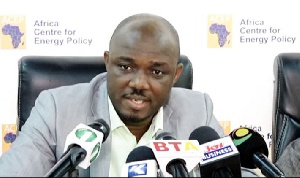 Executive Director of ACEP, Benjamin Boakye
Executive Director of ACEP, Benjamin Boakye
The African Centre for Energy Policy (ACEP) says Ghana’s Heritage fund will not solve the country’s problems if spent today.
According to the energy think tank, the discipline to save for the future is a difficult one but must be encouraged and sustained.
“Spending the heritage fund today is akin to telling citizens to go for their pension because they are faced with challenges in a COVID-19 world. The future of oil is more uncertain today than it has ever been. The fund is envisioned to provide support for the budget when Ghana is no longer receiving revenues from oil and that is an important foresight that should not be crucified today”, it disclosed in its analysis on the recent debate over Finance Minister Ken Ofori-Atta’s comments that the government will tap into the Heritage Fund to support the fight against the COVID-19 pandemic.
The GHF was established to mobilise funds for the future generation, and can be used when the nation is no more producing crude oil.
To put things in proper perspective, ACEP said the Minister of Finance, at all times, has control over 91% of oil revenues annually either as Annual Budgeting Fund Amount (ABFA) expenditure, buffer for the budget in Ghana Stabilisation Fund, debt service, or Contingency spending, adding: “What goes into the savings for the future is only 9% constituting an average of US$65 million a year since Ghana started producing oil. At the same time, an average of US$360 million has gone into the budget annually.”
It added: “The context of the recent announcement makes it easy to reduce the debate to emotional jazz to sooth the pain of COVID-19. It is now a question about “shall we keep the money and let people die?” This is clearly jumping the debate from any understanding of what the Minister is seeking to do.
“The proposed utilisation of the GHF is not different from what Mr Asiedu Nketia and Mr Osafo-Maafo proposed in the past to support the budget in the face of developmental needs of the country and challenging times. But the truth is that if the money had been utilised in the past, it would not have been available today.”
Continuing, the statement said: “There is also a certain myth and misconception around the GHF. Some construe the GHF as savings for some future children who will be born 50 to 100 years from now. This is not in the contemplation of the law. The future is explained to mean when Ghana no longer receives oil revenue. This can be 10, 20 or 50 years from now.
“The future is relative in this context. No one can predict accurately, what the future of oil looks like because it is heavily subjected to internal and external dynamics; to a great extent, production profile of the country and energy transition.
“Many other unknown events are quantifiable in that future equation to justify why savings into the GHF is important as a future income earner to support the budget as envisioned by the framers of the Petroleum Revenue Management Act.”
Fiscal Buffers
ACEP urged parliament to strengthen oversight over the Contingency Fund, saying, the COVID-19 pandemic has shown that Ghana needs a reasonable buffer for unanticipated expenditure to allow swift responses to such threats.
It, therefore, advised the Finance Minister to recognise that the Stabilisation Fund is not a substitute for Contingency spending.
The Contingency Fund is the only fund apart from the Consolidated Fund that is established by the constitution under Article 175.
The power to utilise the Contingency Fund is the is the prerogative of the Finance Committee of Parliament, and not the Minister of Finance.
ACEP is therefore surprised Parliament’s Finance Committee have failed to do its work.
“In the eyes of the Constitution, it must be impossible to have zero balance in the Contingency Fund. Therefore, how this constitutional impossibility became a norm points to a dysfunction of the Finance Committee and to a large extent parliament on its oversight over the Contingency Fund”, it explained.
It also called for further urgent rules on the GSF.
“To enable the fund to deliver on its object, consistency is required on the withdrawals and capping of the Fund. The past practice shows that the discretionary power to cap the GSF is too loose and renders the Fund unable to mitigate revenue shortfalls.”